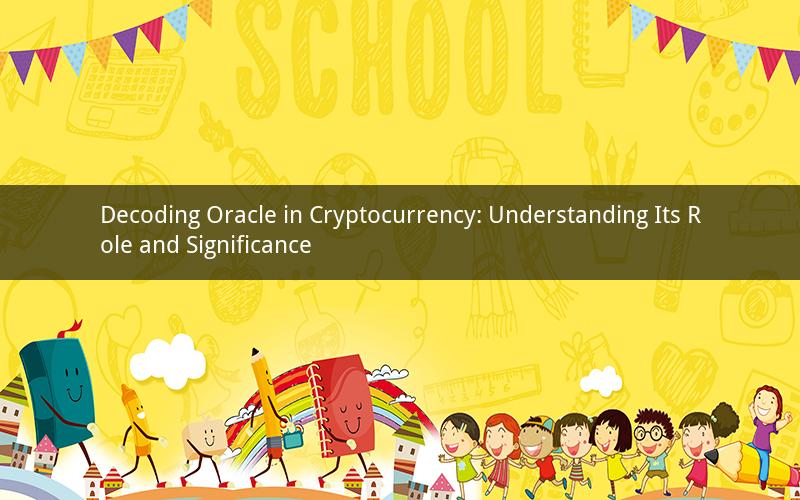
In the rapidly evolving world of cryptocurrency, the term "oracle" has gained significant attention. But what does it actually mean? This article delves into the concept of oracles in the cryptocurrency space, exploring its role, significance, and the various types of oracles that exist.
What is an Oracle?
An oracle is an intermediary that connects the real world to the blockchain. It acts as a bridge between the decentralized world of cryptocurrencies and the traditional, centralized systems that we are accustomed to. In simple terms, an oracle provides real-world data to smart contracts, enabling them to interact with external systems.
The primary function of an oracle is to validate and transmit data from various sources, such as financial markets, weather conditions, or social media, to smart contracts. This data is crucial for the execution of complex decentralized applications (DApps) that rely on real-world inputs.
Role of Oracle in Cryptocurrency
1. Facilitating Smart Contracts: One of the main roles of an oracle is to facilitate the execution of smart contracts. Smart contracts are self-executing contracts with the terms of the agreement directly written into code. However, they require real-world data to function effectively. Oracles provide this data, allowing smart contracts to execute based on real-world events.
2. Enhancing Decentralization: By providing real-world data to smart contracts, oracles help in enhancing the decentralization of the blockchain ecosystem. This is because the data is sourced from various external systems, reducing the risk of manipulation or bias.
3. Enabling Real-World Applications: Oracles enable the creation of DApps that can interact with real-world systems. This opens up a wide range of possibilities, such as decentralized finance (DeFi) applications, supply chain management, and more.
Types of Oracles
1. Blockchain Oracles: These oracles rely on blockchain technology to provide data. They use smart contracts to validate and transmit data, ensuring transparency and security.
2. Traditional Oracles: Traditional oracles rely on centralized systems to provide data. While they may be more efficient, they are susceptible to manipulation and bias.
3. Decentralized Oracles: Decentralized oracles leverage the power of the blockchain to provide data. They use a network of nodes to validate and transmit data, ensuring decentralization and security.
4. Software Oracles: Software oracles are applications that connect to external systems and provide data to smart contracts. They can be either centralized or decentralized, depending on their architecture.
5. Hardware Oracles: Hardware oracles use physical devices to collect data and transmit it to smart contracts. They are often used in IoT (Internet of Things) applications.
Challenges and Concerns
1. Data Accuracy: Ensuring the accuracy of the data provided by oracles is a significant challenge. Errors or manipulation in the data can lead to incorrect execution of smart contracts.
2. Security: Oracles are vulnerable to attacks, such as Sybil attacks or data manipulation. Ensuring the security of oracles is crucial for the integrity of the blockchain ecosystem.
3. Scalability: As the number of DApps and smart contracts increases, the demand for oracles also grows. Ensuring scalability while maintaining security and data accuracy is a challenge.
4. Regulatory Compliance: Oracles that provide financial data must comply with various regulations, which can be complex and challenging.
Frequently Asked Questions
1. What is the difference between a blockchain oracle and a traditional oracle?
Answer: The main difference lies in their underlying technology. Blockchain oracles use blockchain technology to provide data, ensuring transparency and security. Traditional oracles rely on centralized systems, which may be susceptible to manipulation and bias.
2. How do oracles ensure data accuracy?
Answer: Oracles use various methods to ensure data accuracy, such as cross-validation, consensus mechanisms, and third-party audits. They also rely on a network of nodes to validate and transmit data, reducing the risk of manipulation.
3. Can oracles be used for any type of data?
Answer: Yes, oracles can be used for various types of data, including financial, weather, social media, and more. The key is to ensure that the data is relevant and accurate for the specific application.
4. What are the potential risks associated with oracles?
Answer: The main risks include data accuracy, security, scalability, and regulatory compliance. Ensuring the integrity of the data and the security of the oracle is crucial for the success of DApps and smart contracts.
5. How can oracles contribute to the growth of the cryptocurrency ecosystem?
Answer: Oracles enable the creation of DApps that can interact with real-world systems, enhancing the practical applications of cryptocurrencies. They also contribute to the decentralization of the blockchain ecosystem, reducing the risk of manipulation and bias.